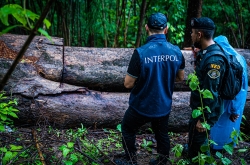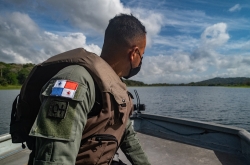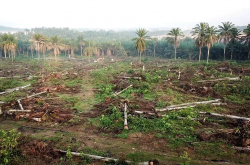LYON, France – Forestry crime experts met at the INTERPOL headquarters this week to explore ways to boost global forestry security through technological innovation and stronger international police cooperation.
With illegal logging and forestry crime undermining global attempts to implement environmental protection policies and sustainable practices, the use of new technological tools to remotely monitor and identify logging concessions and illegal logging sites was high on the agenda of this INTERPOL Global Forestry Crime Conference.
During the three-day (4 – 6 September) event, almost 200 experts representing law enforcement, the timber industry, financial institutions, and non-governmental organizations from 51 INTERPOL member countries in addition to several United Nations organizations saw how modern technology can be used to track timber along the worldwide supply chain.
A technology fair held simultaneously to the conference enabled a selection of private companies from different parts of the world to demonstrate how their technological solutions can be used to assist law enforcement agencies to address forestry crime more effectively.
“Showing us how modern technology can help us address our forestry crime challenges and better identify and disrupt transnational criminal operations has been particularly useful,” commented Hamanda Diniz Campos Carvalho representing Brazil’s Federal Police at the conference.
“This conference is a great opportunity for police from very different parts of the world to realize we are facing the same forestry challenges and share insight on emerging organized crime working methods and how we deal with them in our countries,” added Mrs Campos Carvalho.
“With the global trade in illegally harvested timber causing significant costs to governments in terms of lost economic revenue, INTERPOL has a vital role to play in helping countries establish long term improvements in their response to deforestation and forestry crime,” said Paul Stanfield, Director of INTERPOL’s Organized and Emerging Crime programme.
“This week’s conference has given participating countries a better grasp of the critical strategic intelligence, operational support and technological solutions INTERPOL brings to the table for effectively tackling global forestry crime and the other serious crime it often brings with it,” added Director Stanfield.
As part of steps to bridge international cooperation in the fight against global forestry crime, the conference closed with the creation of INTERPOL’s first Forestry Crime Working Group Executive Board, with representation of member countries in Africa, the Americas, Asia and Europe.
Because the transnational nature of illegal logging raises difficulties for law enforcement and regulators who are often limited in their ability to work beyond their national borders and domestic jurisdictions, INTERPOL’s Project Leaf assists law enforcement agencies in 192 member countries to coordinate a global law enforcement response.
INTERPOL’s work on forestry crime is carried out with the financial support of the Norwegian International Climate and Forest Initiative (NICFI), the German Federal Ministry of Food and Agriculture (BMEL), US Agency for International Development (USAID) and the US Department of State.












.jpg)